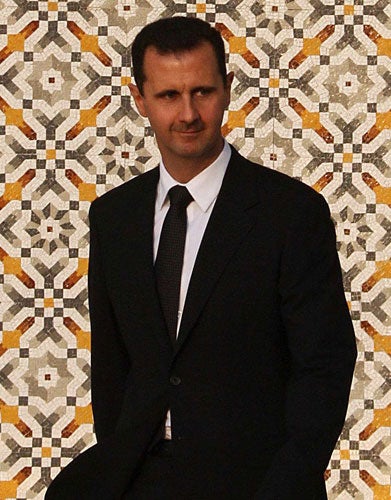Britain in push to bring Syria in from the cold
Foreign Secretary David Miliband accepts invitation to visit Damascus after 'important change in approach'

Your support helps us to tell the story
From reproductive rights to climate change to Big Tech, The Independent is on the ground when the story is developing. Whether it's investigating the financials of Elon Musk's pro-Trump PAC or producing our latest documentary, 'The A Word', which shines a light on the American women fighting for reproductive rights, we know how important it is to parse out the facts from the messaging.
At such a critical moment in US history, we need reporters on the ground. Your donation allows us to keep sending journalists to speak to both sides of the story.
The Independent is trusted by Americans across the entire political spectrum. And unlike many other quality news outlets, we choose not to lock Americans out of our reporting and analysis with paywalls. We believe quality journalism should be available to everyone, paid for by those who can afford it.
Your support makes all the difference.The Foreign Secretary, David Miliband, will travel to Damascus next Monday for the highest-level political talks between Britain and Syria since Tony Blair was publicly humiliated by the Syrian President in 2001.
Seizing back the initiative from France, which has led European efforts to end Syria's diplomatic isolation, Mr Miliband said yesterday that he had accepted Syria's invitation as a result of an "important change in approach" by Damascus. The Foreign Secretary said he recognised the "constructive" role Syria could play in reaching a comprehensive solution for the Middle East, at a time when the Syrians have engaged in indirect talks with Israel in Turkey.
He also pointed to Syria's establishment of diplomatic relations with its neighbour Lebanon and its efforts to curtail foreign fighters and weapons into Iraq as signs of greater co-operation by Damascus.
But the visit is not expected to produce concrete agreements and will not focus on trade issues, according to Foreign Office sources.
The Syrian embassy said the visit had been scheduled in the light of the "positive and important regional role of Syria" and came at a time of "greatly improved bilateral ties" between Syria and Britain.
Although Britain hopes that Syria can be prised away from its embrace of Iran, which arms militant Islamic factions hostile to Israel in Lebanon and the Palestinian territories, the Government has dropped its insistence that Syria should end its support for Hamas and Hizbollah after Damascus rejected any "preconditions" to improving relations.
The Syrian Foreign Minister, Walid al-Moualem, stressed during a visit to London two weeks ago that Syria would continue to have "very good relations" with Iran.
It is not clear whether Mr Miliband will meet President Bashar al-Assad, although he has asked to see the Syrian leader, who trained as an ophthalmologist in London.
The Blair government courted President Assad by dispatching secret envoys and government officials but the strategy did not always meet with success, as Mr Blair discovered at a press conference in Damascus in October 2001, a month after the twin towers attacks, when he was subjected to a humiliating lecture in which Mr Assad defended Palestinian suicide bombers. The following year Mr Assad was rewarded by a visit to Downing Street and tea with the Queen.
Mr Miliband said he had been pressing Syria for co-operation on counter-terrorism, Lebanon, Iraq and the Middle East peace process for the past 15 or 16 months. Both countries had expressed satisfaction at the results of the Syrian Foreign Minister's visit to London on 27 October, the day after US special forces raided Syria, and now want to raise the relationship to "a greater degree of trust", said a Foreign Office source.
British officials said that both the Bush administration and Israel were aware of Mr Miliband's Syria plans.
* Iran test-fired a new generation surface-to-surface missile yesterday, state media said. Iran's Defence Minister, Mostafa Mohammad Najjar, said the Iranian-made missile named Sejil had a range of 1,200 miles.
Join our commenting forum
Join thought-provoking conversations, follow other Independent readers and see their replies
Comments